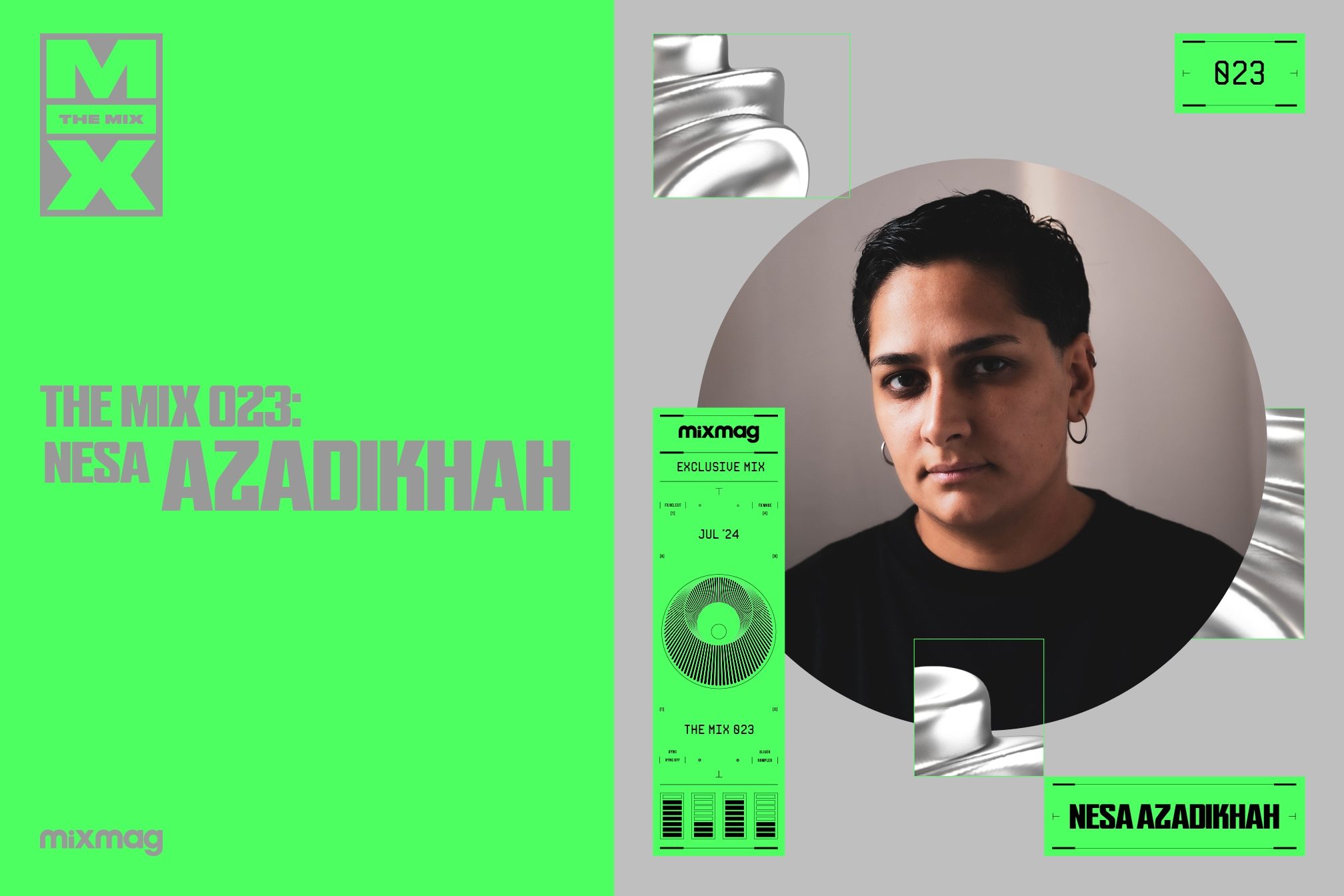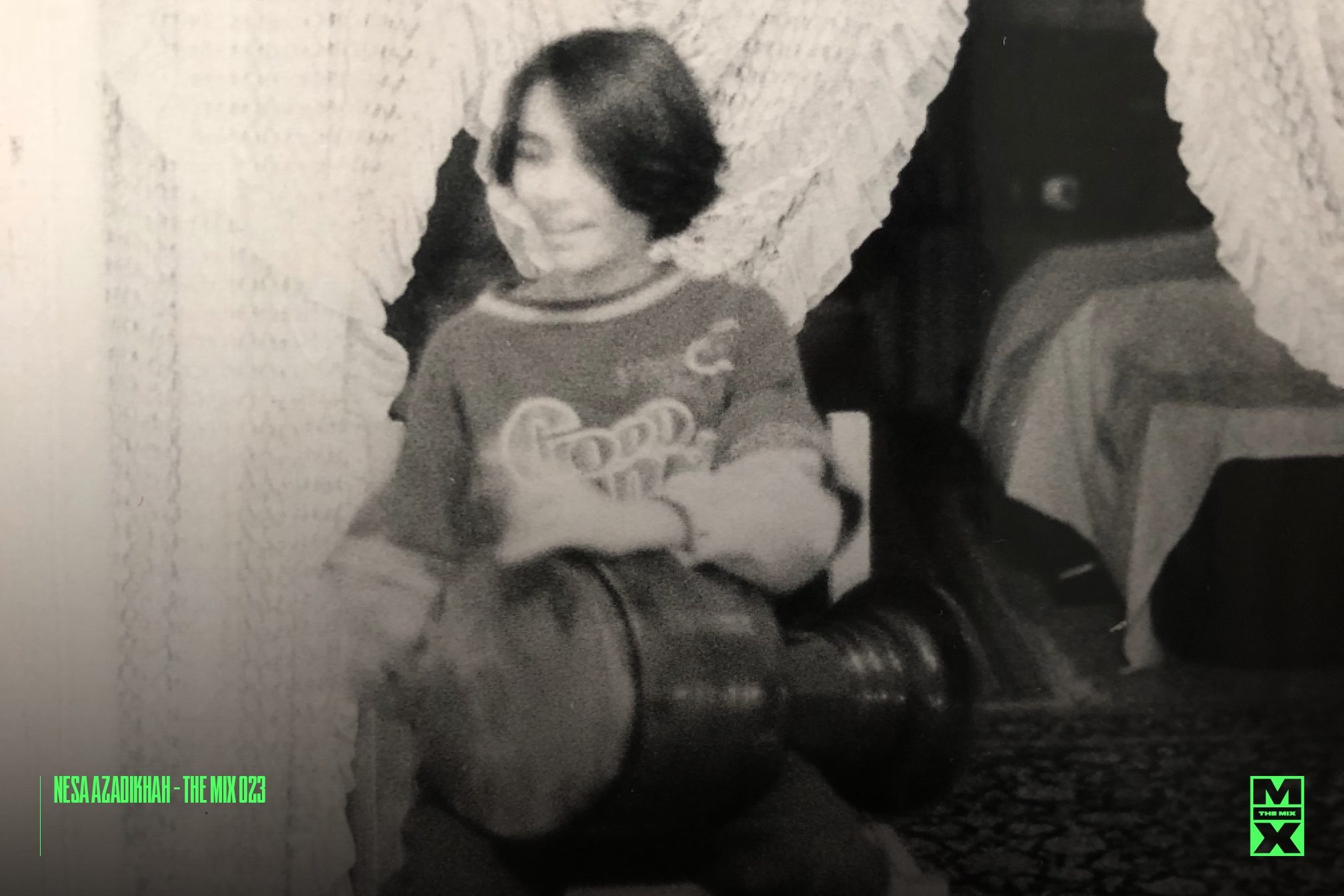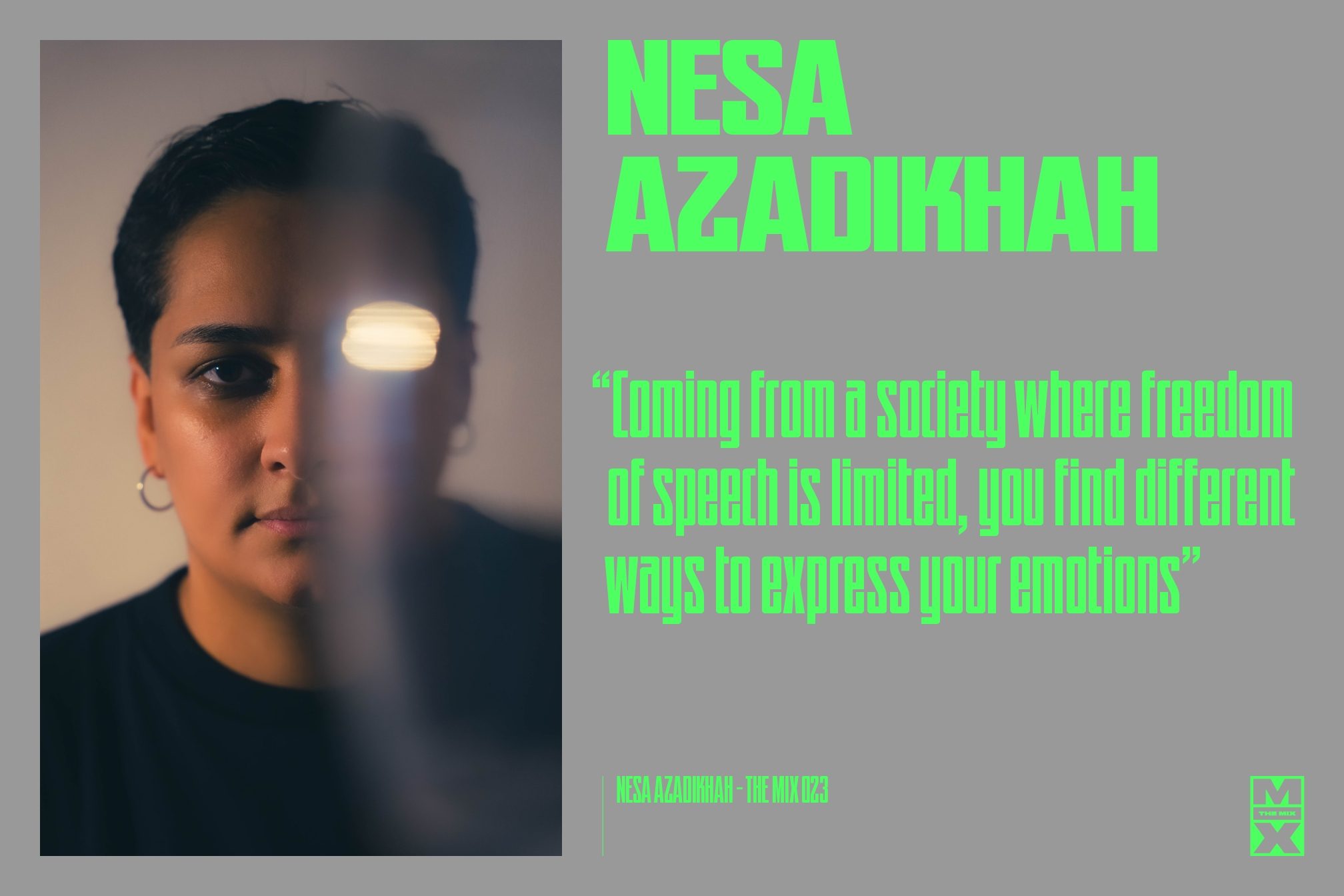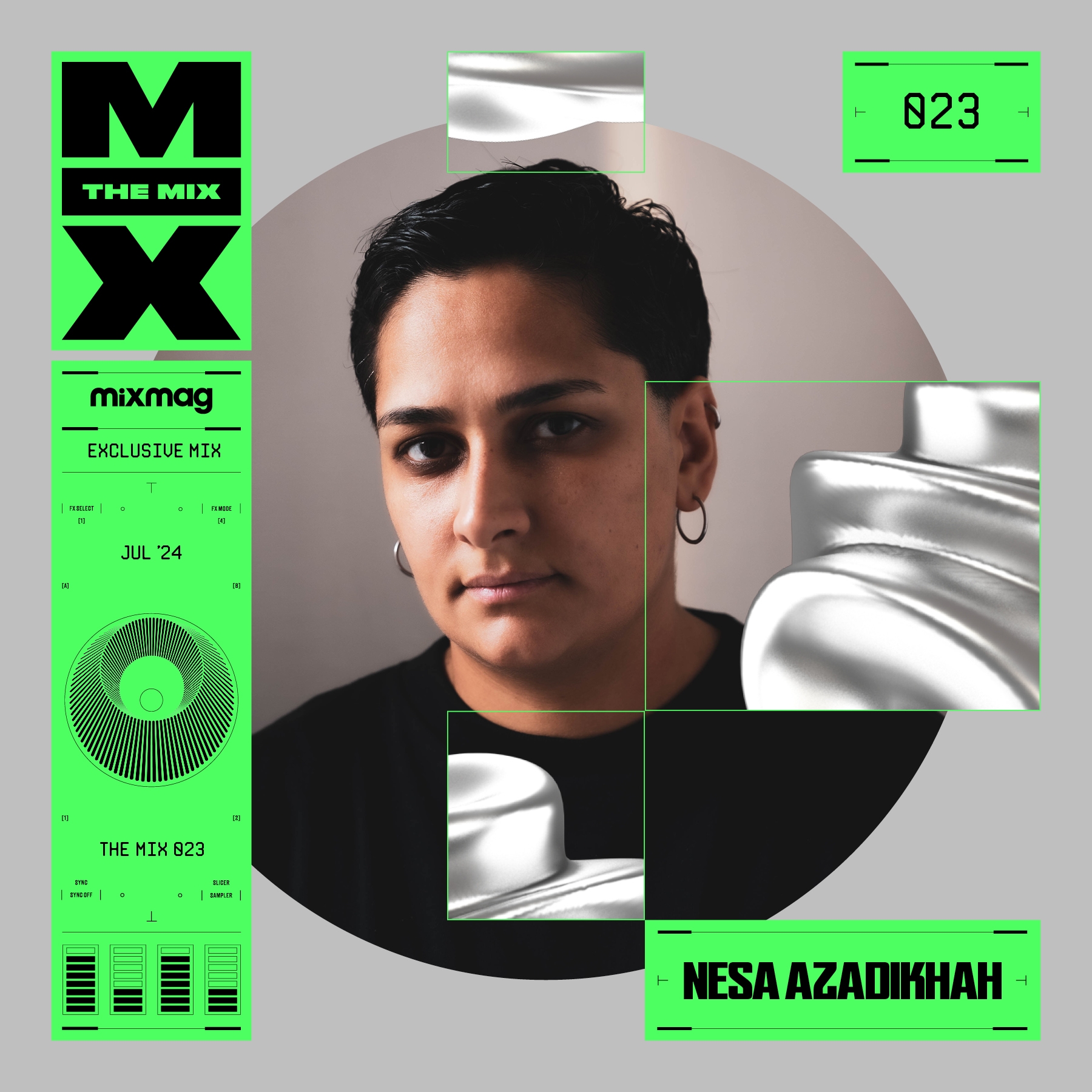 Music
Music
The Mix 023: Nesa Azadikhah
Listen to a smooth mix through techno, electro, and breaks from one of Iran’s foremost tastemakers as she chats about women’s liberation, juggling multiple music projects, and her early music learnings with traditional Iranian instruments
In 2022, following the death of 22-year-old Iranian woman Mahsa Amini who was arrested and allegedly brutalised by police for wearing her hijab out of accordance with government standards, protests cropped up across Iran. Women picketed, cut their hair, and removed their hijabs in an act of protest against the oppression many face throughout the country, sparking a new wave of energy in the right for women's rights in Iran. The slogan ‘Woman, Life, Freedom’, initially coined by women-led Kurdish movements in the mid-2000s, became its rallying call. It was Mahsa’s death, and the protests that subsequently followed, that inspired Iranian producers Nesa Azadikhah and AIDA to release a charity compilation album raising money and bringing awareness to the cause, comprised of tracks from Iranian women. The record was described as a project dedicated to “the recent uprising of people, especially the women in Iran who have endured silencing, censorship, and forced control over the past four decades”.
‘Woman, Life, Freedom’, as the record was named, marked the first release of a joint venture between Nesa and AIDA, Apranik Records. Still focused on bringing awareness to this issue today, the label also operates as an outlet for productions from its co-founders, while their brand new side project, Makhunik Records, gives a look into the pair’s broad tastes, focusing “mainly on genres like techno, breaks, and IDM”.
Read this next: Iranian rapper SÄYE SKYE: “They go after us because they know the power of art”
On her solo projects, Nesa Azadikhah has been one of Iran’s foremost tastemakers for more than a decade. Growing up in a musical family and learning how to play traditional Iranian instruments at a young age before segueing into dance music, Nesa earned her stripes as a key member of Tehran’s dance music community and eventually relocated to Paris, where she is now based. As a DJ, producer, and sound artist, Nesa’s style blends field recordings with techno, ambient, breaks, and IDM to a mind-melting effect. Today, Nesa works on projects that bring Iranian artists into the light - whether that’s through her labels established alongside AIDA, or her editorial and streaming platform Deep House Tehran, where she platforms new emerging talent from around the country.
We spoke with Nesa ahead of the release of her new joint EP with AIDA, ‘Polychrome’, and chatted about women’s liberation in Iran, running multiple music projects, and learning how to make music using traditional Iranian instruments. Check it out below alongside an hour-long mix spanning techno, electro, and breaks.

Your love for music started by playing the tombak drum at age six - can you tell us about your musical background growing up?
Coming from a family that loves and appreciates art in all its forms, their support has meant a lot to me. My dad’s cassette collection played a major role in introducing me to the world of music.
In the beginning, I explored a few traditional Iranian instruments such as the Daf, Tonbak, a bit of Santur, and Tar. I can confidently say that if I hadn't naturally followed this path, my journey and understanding of music might have taken a different direction or not been as profound as they are now. There is a soul in these instruments.
You also began DJing at a young age. What was the dance music landscape like in Tehran at that time?
In the 2000s, I began DJing, usually at small gatherings of friends and sometimes even weddings! Weddings were a whole different experience, but they provided great practice for me at the time. When I started, there were already several established DJs in Iran, like many other countries. Today, we have a much larger and more diverse group of artists from all genders representing their unique sounds. However, back then, DJing wasn't taken very seriously, so we often played at various places just for fun and often for free.
As a producer, composer, and sound artist, your music often blurs the lines between techno and ambient. Where do you pull inspiration from?
In the beginning, I’d record city sounds and various noises, sometimes incorporating the instruments I was familiar with to give them a new life. I've always thought it would be interesting to invent a unique language that others could understand, so I found the idea of blurring the lines between genres fascinating. Isn't it? You'll soon hear something similar to this in my upcoming EP with AIDA.
Read this next: In Session: Sepehr
Can you tell us about both Apranik Records and your new record label, Makhunik Records? What sets them apart from each other?
Apranik Records and Makhunik Records have different core missions and focuses. Apranik, which I co-founded with AIDA, is dedicated to amplifying the presence of FLINTA* (Female, Lesbian, Intersex, Non-Binary, Trans, and Agender) artists in the music scene. The representation of these groups has been limited, so we founded the label, especially in light of the ‘Woman, Life, Freedom’ movement. Our goal was also to support FLINTA* individuals who have been affected or injured, using the profits generated from our EP.
Makhunik Records, on the other hand, will focus mainly on genres like techno, breaks, and IDM.
You’ve helped to platform Iranian artists through your work in the dance music community over the years - what does the scene currently look like for young artists in Tehran and even further afield in Iran?
With my other platform, Deep House Tehran, we've undertaken various projects with Iranian artists over the years, often starting with the recording of a podcast.
The situation has evolved in light of previous years. We now see more talent emerging in this field in Iran, and it's amazing to witness more female artists stepping into the spotlight. However, I should mention that my information comes from artists and managers, as I'm no longer based in Iran. So, I'm not entirely sure if the scene has become easier or if our women have simply become even braver and stronger.

Your platform, Deep House Tehran, also gives many emerging artists a launchpad through streams, podcasts, and editorial. How did that come about?
It began 10 years ago. I had a strong urge to stay updated with the music scene, and I faced many challenges in the beginning when trying to market myself. At that time, there were only a few platforms representing artists in Iran, so Deep House Tehran was born. Over time, it grew bigger — not just because of time, but also due to the hard work and dedication I put in along the way. It’s a collective effort for the majority of the platform's timeline, I couldn't have done it alone.
After the death of Mahsa Amini in 2022, you protested through the release of a compilation record, ‘Woman, Life, Freedom’. Can you give us some background on this project and how it was received?
Coming from a society where freedom of speech is limited, you find different ways to express your emotions — this was our chance and our voice. The feedback was great, especially for the first release of our record label. We received up to 2,000 positive responses and some impressive fundraising.
You chose to represent female Iranian artists on the compilation to raise awareness of the issues under an oppressive government - how did you select the artists who took part?
I already knew most of them through Deep House Tehran’s projects, and after more than 10 years in the scene, you naturally gain a lot of connections. To give a wider space to those who wanted to come forward for the first time, myself and AIDA used our social media platforms to invite artists to send in their demos and sets.
Your first EP with AIDA on Apranik, ‘Polychrome’, lands later this month, which you said draws on your individual journeys as artists. Can you tell us more about that?
‘Polychrome’ consists of a few different genres, such as house, techno, and breaks, and will be released at the end of the month. We planned the EP to showcase who we are through our sounds, as we both play and enjoy various genres within this spectrum. At the same time, the EP reflects our emotions, taking you on a journey through different musical landscapes.
Read this next: Raving Iran: The promoter/DJs risking their lives to party
You previously divided your time between Tehran and Tbilisi holding down a residency at TES Club - what was that experience like?
Before I relocated to Paris in October 2023, I was splitting my time between Tehran and Tbilisi, mainly for personal reasons. Being a resident DJ at one of Tbilisi's clubs was a dream come true for me. The TES team made it an even better experience with their cohesive, attentive, and safe environment. Thanks to them, I'm excited to share that I'll soon be hosting my own party there!
What’s next for you?
This year is all about EPs for me! I've been deeply focused on production, so expect a flurry of releases from me across several labels, including Shaytoon Records, Paryia Records, Kulture Gallerie Records, Pornceptual, and my own label too.
Right now, I'm also working on my next five releases for Makhunik Records and am gearing up for a tour across a few countries.
Can you tell us about your mix?
I have to admit, I recorded three sets for this one (haha, don’t call me picky!). In the end, I chose the one that resonates most with my personal taste. I really appreciate that unique touch you referred to earlier. In this set, you’ll embark on a smooth journey through a variety of genres. I hope you enjoy the ride!
'Polychrome' is out on July 26, get it here
Gemma Ross is Mixmag’s Assistant Editor, follow her on Twitter

Tracklist:
Na Nich - About Face
Pletnev - Wrapped In Latex, In Berlin, Alone
Moisk - 13th Floor
Cari Lekebusch & Orion - Tribe
Gearmaster - Sugarworld
Generali Minerali - Trance Fox (Up coming - Makhunik Records)
T_St - Don’t Waste Your Time (Unreleased)
Speedy J - Ping Pong (Remastered 2007)
JXTPS - Interzone
Neo - Suppressed Ac]ons ( + Radiohead - My Iron Lung Mix Nesa)
Bungle - Asymmetric
Sathurnus - Sinistar
Jns007 - Over me


